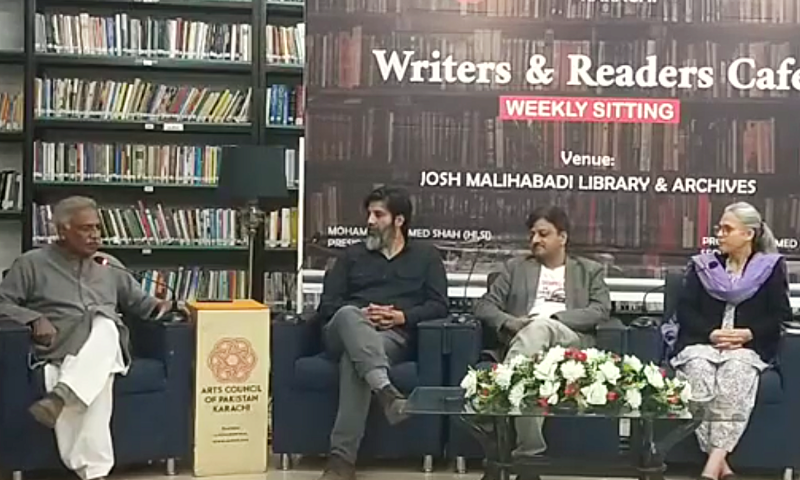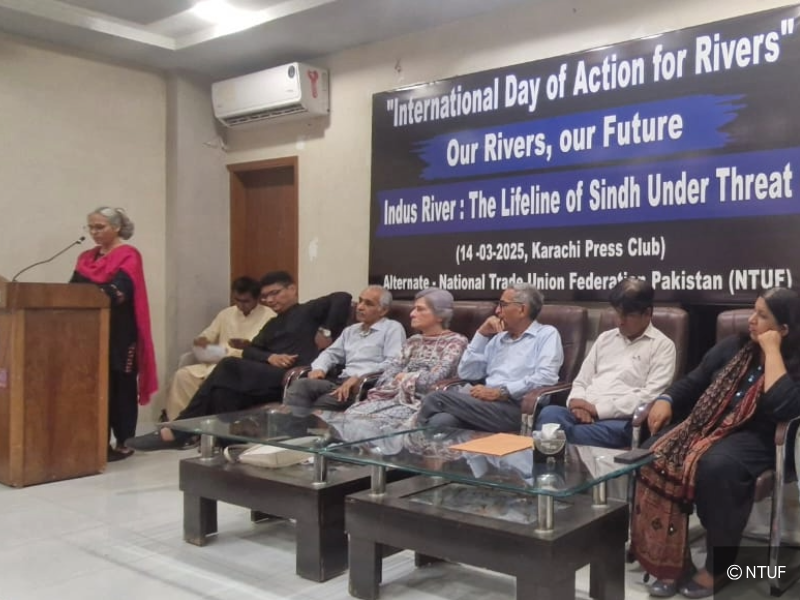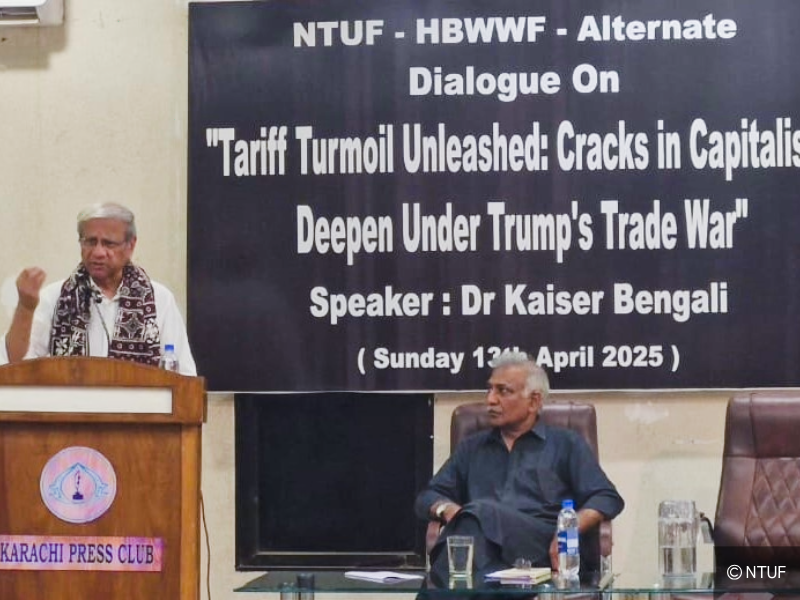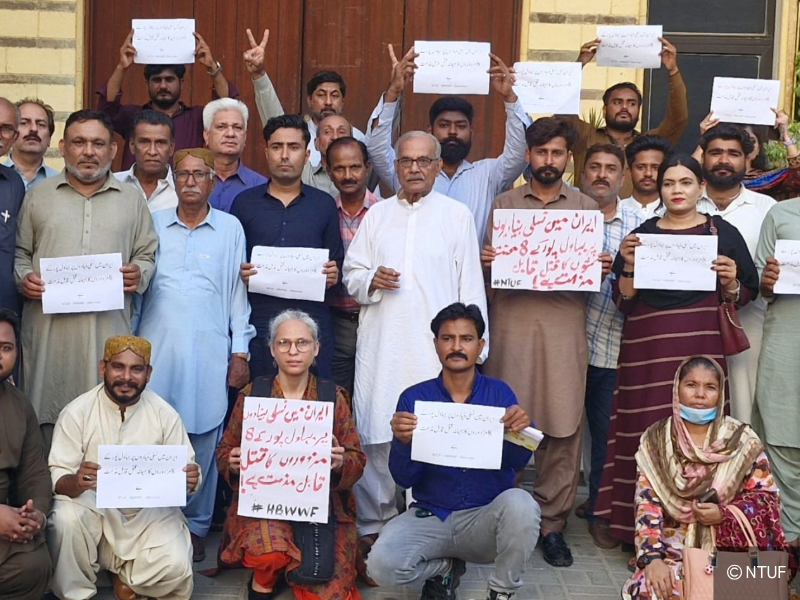
Gadani Shipbreaking Workers Demand Safety Reforms on 8th Anniversary of ACES Disaster
November 1, 2024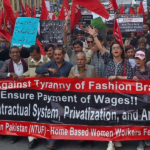
Workers Rally Against Exploitation and Anti-Labor Policies in Karachi
January 19, 2025KARACHI —The Writers and Readers Cafe at Josh Malihabadi Library, Arts Council of Pakistan Karachi, hosted a critical discussion on trade unions’ rise and fall on 2 January 2025. National Trade Union Federation General Secretary, Nasir Mansoor, moderated the session with Zehra Khan from Home Based Women Workers Federation, Paras Jan from Revolutionary Communist Party, and Mansoor Khalid from the US’s Service Employees International Union.
The Informalization Challenge
The discussion opened with Nasir Mansoor questioning Khan about global workplace informalization. He framed worker identification within “a triangle having a workplace, a type of work and their employer,” noting these prerequisites often go unmet in informal sectors like home-based work.
“Now even the formal sector is becoming informal through third party contract system. Especially women make the majority of informal and third-party contract workers,” Khan said, linking this transformation to globalization of work and finance.
Khan’s union-building journey began as an academic thesis, inspired by her mother’s home-based work. Despite initial revolutionary optimism, she found “practically it was different because they did not have enough support from the people and it was difficult to make women understand their rights and motivate them to stand up for them.”
Through sustained effort, they secured legislation, the Sindh Home-Based Workers Act, recognizing home-based workers, granting access to social security and pension benefits. This success emerged from “giving a class identity to these women and to this struggle and therefore men also joined them in this movement.”
Women-Led Movements and Victories
“If we look at the past 20 years we see that women-led movement have made considerably great victories,” Khan noted, citing the lady health workers movement, the Baldia factory fire response, and home-based workers’ achievements.
Mansoor expanded on women’s leadership, noting that “in the Okara movement, Christian and Muslim women fought together to their lands from military takeover.” Despite two dozen casualties, the movement persisted. He highlighted women’s ongoing leadership in the Balochistan movement against enforced disappearances.
Working Class Identity and Historical Context
Jan defined workers as “anybody who in order to fulfill their and their family needs, subsistence, sell their services.” He referenced Marx’s observation that workers have “nothing to sell but their chains.”
He traced labor movement evolution through the 1825 Chartist Resolution demanding universal suffrage, noting voting rights were initially restricted to property owners. The 1861 eight-hour workday movement, despite facing violent suppression, established Labor Day’s legacy. Jan emphasized that “UK Labor Party was the only party of its kind that was developed by unions,” preceding the Russian Revolution’s influence on union development.
He explained how capitalist and colonial forces employed divide-and-rule tactics to prevent worker control, with Mansoor adding that British colonizers responded through measures like the Manto Marley reforms.
Modern Challenges and Global Context
Khalid emphasized unions’ international necessity for success, pointing to their decline in the US as capitalism’s vanguard. This decline, he argued, contributed to working-class rightward shifts.
Jan countered this analysis, asserting that “working class is like a mountaineer, they don’t see theory but see the way where they have to step in order to rise to the top.” He argued workers turn to right-wing populism because “revolutionary ideas do not make it to the mainstream most often.”
Pointing to new developments, Jan noted unionization at Amazon and Apple, predicting potential general strikes. He said ” Shawn Fain has predicted that a general strike can take place in the US in 2028,” indicating labor movements’ resurgence.
Mansoor referenced Gramsci’s observation that “the old world is dying, and the new world struggles to be born: now is the time of monsters,” connecting this to social democrats’ rightward shift post-Soviet Union. He added that “an inbuilt problem of capitalism is that if there would not be any revolutionary forces than fascism will take place.”
Contemporary Labor Issues and Narratives
Discussing the German due diligence law and Pakistan Accord, which are outcomes of the labor movements stemming from the Baldia factory fire and Rana Plaza disaster, Khan criticized the ongoing narrative battle: “it was floated as a workers right compliance mechanism but the employers, the brands, call it due diligence, so alongside there is a war of narrative. They are floating ideas and we are accepting them.”
She noted Pakistan’s trade unions face ethnic and religious divisions, with workers focused on economic survival. “It is hard to make people understand that the problems most time they face are not from God, but created by humans who control them through wage, employment and government and social institutions,” Khan explained.
Khan criticized the Pakistan Peoples Party’s transformation, stating it “which once used to call itself the party of workers have also become a tool and ally of capitalism by doing privatization and weakening labor institutions and their agency.” She called for unity among revolutionary forces despite theoretical differences.
Gig Economy and Future Challenges
Khalid described the gig economy as “surveillance capitalism that seeks to make its control over workers stronger to maximize its profits.” He noted unions’ struggles within legal constraints to organize gig workers, emphasizing political education’s importance.
Mansoor highlighted that “around 70 percent of workers are under the age of 40” in the service sector, facing government and state resistance when challenging illegal dismissals.
Jan identified signs of “pre-revolutionary crisis” in Pakistan, with increasing youth politicization. He criticized international organizations that “are bent on restricting the labor movement within the framework of capitalism and instead of teaching workers and unions to become revolutionary they are forcing them to become reformists.”
“For the intellectuals the fight has always been theoretical while for the workers it is always the matter of life and death,” Jan emphasized.
The session concluded with discussions on unions’ dual challenges: gig economy and climate change. Mansoor cited revolutionary developments in Latin America, Venezuela, Sri Lanka (where “a known Marxist has become the president”), and Nepal, where “the communist party is in power and communist forces are in opposition,” demonstrating global working class advancement.
A question-answer session followed, addressing gig economy and climate change concerns, which Mansoor identified as primary challenges for modern labor movements worldwide.

